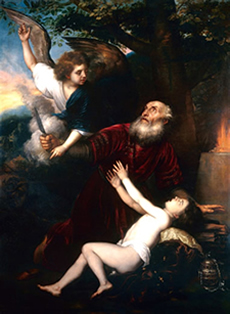Misconception #45
When Abraham Sought to Sacrifice Him, Isaac was Still a Child With No Idea What His Father was Planning
One of the most pervasive ideas mankind has about The Bible is that because it was written by so many different writers there’s no point in believing in its so-called “divine” authorship. It’s therefore assumed to be a fraudulent book, which only an idiot or a fool would treat as an object of trust.
On the face of it, this assumption seems reasonable; yet this thread of logic unravels in an instant when one considers the following alternative. Yes, The Bible was written by different authors, each writing from their own perspective, but this, in and of itself, doesn’t negate the possibility of its divine origins. In fact, it’s this very diversity that provides us with the clue that it can’t possibly be the crude by-product of human inspiration.
What makes The Bible so amazing, actually, is that even though it’s a book written across the entire span of human history, it still bears the unmistakable stamp of a single point of view. In other words, although so many hands have “stirred the pot,” so to speak, the scriptural record as a whole still bears a remarkable similarity through in and throughout. From age to age, what begins as a germ of thought in The Old Testament unfolds with astonishing continuity in The New Testament. From author to author, every book in The Bible echoes with the same voice, unfolds the same storyline. And it’s this fact that rings out to those with ears to hear and eyes to see: This is no coincidence; it is, in fact, the greatest proof of its divine authorship.
With this idea in mind, let’s examine our next misconception, in another story that’s troubled scholars and laypersons alike for generations. It involves one of the most famous dramas in The Bible, if only because it’s commemorated by no less than three of the great religions of mankind—Judaism, Christianity, and Islam.
Story Continues Below
Says Richard Price—the founder and CEO of Academia.edu—on his podcast In Depth With Academia:
Fish Tales (From the Belly of the Whale): Fifty of the Greatest Misconceptions Ever Blamed on The Bible is:
To hear Price’s book review of Fish Tales (From the Belly of the Whale), CLICK HERE.
To hear Kent and Zen Garcia talk about correcting biblical misconceptions, from September 9th, 2021, CLICK BELOW.
Story Continues From Above
According to tradition, Abraham was ninety-nine years old when God visited him with good news of the birth of a son to be conceived by his wife Sarah, who was almost ninety years old at the time. Yet, in spite of a brief bout of skepticism, Sarah did conceive the following year, and Isaac was born, much to the couple’s shock and delight.
Before long, the child was growing up, happy and healthy, but soon, unbeknownst to his wife and son, Abraham was again visited by God. This time, however, the Lord came as the bearer of bad news. The same child the Lord had bestowed upon Abraham and his wife would now have to be offered up to God as a burnt offering.
Although horrified, Abraham still determined to carry out the difficult task that the Lord demanded of him. So, without ever letting on to his intentions, Abraham took his young son from his doting mother and led him to Mount Moriah. And there, he prepared to sacrifice his beloved Isaac, in a sacred, howbeit bloody, ritual.
Fortunately, for all involved—as the story goes—God intervened at the last possible moment, staying the hand of Abraham just as he was about to kill the child. The Lord then provided a substitute victim, a ram caught in a thicket, which Abraham was told to slay in place of his son.
So Isaac was spared a grisly death that day, Abraham passed his supreme test of faith, and God saw that his chosen man was even willing to sacrifice his beloved son if He asked him to.
Another thrilling story with a happy ending, right? Well, yeah, sure. But what, exactly, was the point of the whole exercise, really?







